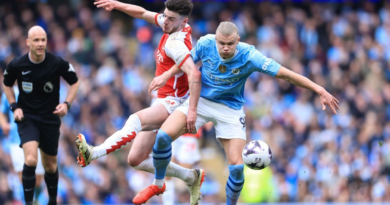LGBTQIA+ college athletes cashing in on NIL deals
Nearly three years after the Supreme Court ruled against the NCAA in a landmark case that opened the door for college athletes to strike name, image and likeness (NIL) deals, thousands have leveraged the opportunity to work with brands big and small. Many students focus on local small businesses, or work with brands that target their sports, schools or interests.
For gay athletes who are out, such as former Nebraska gymnast Sam Phillips and TCU basketball player Sedona Prince, that can mean balancing their platforms advocating for LGBTQIA+ rights with sponsored messages for all sorts of brands.
Phillips, a team captain out of Woodland Hills, California, graduated from Nebraska this spring and plans to use one more year of eligibility to compete next season for Illinois. He recently won two All-America honors at the NCAA Championships. He founded Nebraska’s chapter of Athlete Ally, was the only out male athlete at the school and has NIL deals primarily with small businesses and local companies.
Prince, a 6-foot-7 forward out of Liberty Hill, Texas, played for Texas (2018-19), then Oregon (2019-22) before moving to Fort Worth (2023). She said she has landed upward of 30 NIL deals since the practice was allowed. They include brands such as Crocs and Butterfinger, as well as local businesses. She was instrumental in NIL’s implementation, having added her name to the lawsuit that accused conferences of violating the law by refusing to pay players.
In interviews with ESPN, Phillips and Prince discussed how they have navigated NIL deals as queer student-athletes. Their answers have been edited for length and clarity, but the substance has not changed.
What has been your experience with NIL?
Phillips: I know from the get-go that I love social media and wanted to grow my page and so that gave me the fuel to get going with it. I just had to be a shark and I had to be really aggressive with it. So literally from the day that the ruling passed I was reaching out to brands.
It’s really fun to grow in that sense and learn about marketing, learn about brands and brand images and brand awareness and be able to grow my brand, and to find out what I want to do in life, the message that I want to portray. It’s been really fun to get creative with the different campaigns and partnering with different people.
Prince: I came into a state of college sports that was completely different than what it is now. NIL obviously wasn’t allowed. … It’s crazy to see how much the landscape has changed over the course of seven years. Being able to be a part of that and being able to be a student activist pushing that change is the biggest blessing and an amazing honor.
Right now, students are getting more than just money. In my opinion, student-athletes get a lot more protection and representation outside of their universities, so that’s what I’m pushing for right now. It’s amazing to see that there’s settlements and things getting pushed and conversations being had, but I do think that student-athletes should be allowed to have their voices more and be protected more, as well.
Smaller-platform athletes are doing NIL deals with local community brands of small business right in the community, and that’s what I love to see. It’s connecting the fan base to the student-athletes and building a tight-knit community within these little college campus circles.
We got pushed into the brand-new industry as 24-year-olds, into this new workforce. There’s no rules, there’s zero regulations, there’s zero representation in administration, and so it was kind of a whirlwind.
What’s it like being a leader in the NIL community and in the sports LGBTQIA+ community?
Prince: I try to do a lot of deals with local small businesses, mostly LGBTQ-owned. [Those] are the things that are most dear to my heart and fun for me … what I love to do.
I think they mesh well. We have fan bases from every single different community, with women’s basketball, LGBTQ community, my budding fans that don’t necessarily watch basketball but are a part of the queer community — they just want to tune in because they see me as a voice in that community, as well, and a leader there. Combine these different people and just watch women’s basketball together, enjoy the sport from different sides.
Phillips: [When I came out publicly,] it was good. [My teammates] all loved me, they all accepted me [but] it’s hugely tough being out in college athletics. Collegiate male athletics is a very masculine-dominated space, a lot of locker room talk, and you spend a lot of time with boys aged 18 to 23 who are also finding themselves out in the world. … It was tough being the only out male athlete at Nebraska.
I definitely relied on a small community of allies. It has its good days but also has its bad days, but I think people are continuing to learn and try harder to break those barriers.
How do you choose which deals to pursue?
Prince: If they don’t respect who I am and what I do off the court, then I don’t work with them. But everyone’s been respectful.
Being LGBTQ and being an advocate in that community is a big part of who I am and my personality and what I love to do. Working in that space and doing brand deals that align with that and then push that cause and fight for other people that are not represented in that community is an amazing thing to do.
I did a vintage photoshoot with a local LGBTQ-owned TCU vintage brand [Wild Thing]. Just for a couple hundred bucks, I just wanted to be a part of their small business and help them out and get that going. My first NIL deal ever was for a company that gets other women brand deals. I’ve always been very passionate about it and I love it. Working with both small and big businesses is very important to me.
Phillips: I want to partner with a company who’s not going to shy away from who I am and is going to help me express myself. Using my platform for my advocacy is vitally important for me, so partnering with brands that can let me tell my story and share that side of me is so important. That’s why I love Clear Cover [insurance], because they’re all about sharing my story as a Black queer athlete in Nebraska.
I make sure to see other campaigns they’ve done, because that’s hugely important. The campaigns are about self-love, or revolve around advocacy, that’s important. I also look at how they treat me and interact with me. … It’s really valuable and important to me that they’re not putting words in my mouth.
One of the first companies I worked with was a Black-owned business. … I also partnered with Our Color, which is ankle tape for athletes, and it has athletic tape and wrap for Black and brown athletes. All the time, you see skin-colored tape for white individuals but there’s no skin-colored tape for Black gymnasts and brown gymnasts. I’ve been trying to dive deeper into that.
It’s kind of hard being in Nebraska, fishing out the Black-owned businesses or queer-owned businesses. So that’s something I could try to do a better job of, actually.
It’s definitely more like [those businesses] are taking care of me. A lot of these smaller brands, it’s a really face-to-face, very personal relationship. The hospitality is just 10 times more [present].
Have you faced any issues in the NIL space because of your sexuality?
Phillips: I’ve only had one negative experience. I was on Instagram and there was a Christian athletic apparel page, they were like, “Open call, reach out if you want to be a brand partner.” So I reached out, I think sharing my story can be hugely important for those who are in the community and Christians and are having trouble navigating that. They basically were like, “We don’t agree with that lifestyle, we don’t want to partner with [you]. That was my first and honestly only negative experience. But that shows the importance of knowing who you’re partnering with.
Prince: In 2018, my first year [in college] I had just come out, was trying to figure out who I was and what my sexuality was. Someone told me, “Don’t post about being gay, it’s a really bad look, people aren’t going to work with you in the future, coaches don’t like that.” And now I’m working with brands that are in the nonbinary space and working with mostly LGBTQ-owned businesses. That is so beautiful and so amazing, to see how far we’ve come.




